Holly Springs will have a special claim to fame when the United States Air Force Academy welcomes cadets back to campus in Colorado Springs for its new semester. Five of the cadets are friends and classmates who all graduated from Holly Springs High School—brothers Caleb and Wesley Ferguson, Valerie Smith, Alex Leudeke, and Sam Kulasingum. Considering there are just over 4,300 undergraduates currently enrolled at the Academy, having five from the same high school, at the same time, is impressive.
Also remarkable is the fact that all five were available on the same day at the same time to gather for an interview.
Conducting an interview with five people for the same story can be tricky, so I looked to the Academy itself for insight into how best to structure our discussion and, ultimately, this article. I decided that each cadet certainly would merit her and his own narrative, but that the focus would be the same: How do the Academy’s four “pillars of excellence” and statement of core values apply to your personal experience and future plans?
A Bit of Background
Acceptance into a U.S. service academy is a long and daunting, not to mention highly competitive, process involving a lengthy application and sometimes multiple interviews to secure one of a limited number of coveted nominations from an area representative of the U.S. Senate or Congress. As the cadets explained, it’s a process that ensures that every class be well rounded and diverse, comprised of people from every corner of the U.S.
A candidate’s academic strength, extra-curricular record, leadership qualities, and athletic abilities all play a part in a student’s nomination, although some top-tier athletes are recruited by Academy coaches who provide a candidate with what’s called a “blue-chip” acceptance. By no means a shoo-in, these student-athletes make a verbal commitment to the Academy and must still follow the application process, but their political nomination can be waived and, thus, offered to another candidate.
Once accepted, all cadets train in accordance with the Academy’s four “pillars of excellence” – Military Training, Academics, Athletics, Character Development – and are guided by the core values of the Air Force, “Integrity First, Service Before Self, and Excellence in All We Do.”
Of the five, Caleb Ferguson is the highest-ranking with the “first-class” designation given to cadets in their senior year. Valerie Smith and Alex Leudeke are cadets second-class, or, juniors. Wesley Ferguson and Sam Kulasingum are Basic Cadets, meaning they are incoming freshmen.
Upon graduation, all will be officers with a rank of Second Lieutenant and a Bachelor of Science degree in their major field of study. Their time commitment to the Air Force, however, will depend on their particular career field.
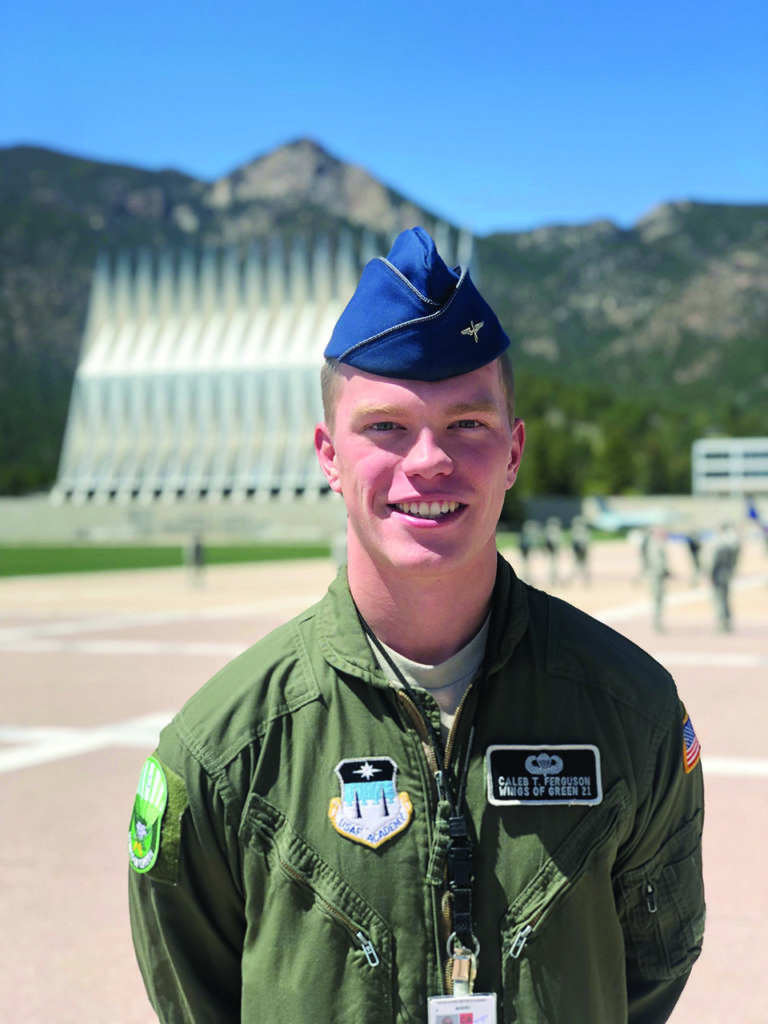
Cadet 1st Class
Caleb Ferguson
Pillar 1 | Military Training
What aspect of military training have you found to be most interesting?
I got selected to be a member of the parachute team. I’m now a jump master and instruct our free-fall program. It’s a super-cool opportunity and allows you to develop your leadership skills. I went through the parachuting program after my freshman year. I wasn’t super gung-ho about it at first, but after my first five jumps and I got my jump wings, I fell in love with it. I tried out for the team and was lucky to be selected. Now I get to teach people how to parachute for the first time.
What characteristic(s) do you feel helped best prepare you for military training at the Academy?
Leadership skills…and on the other side is being a follower and being coachable. You have to be able to accept criticism to be able to learn whatever training you’re doing.
Pillar 2 | Academics
What academic strength(s) from high school are helping you in the Academy?
Having a strong academic work ethic. Academics at the Academy are challenging and at the end of the day, it comes down to your work ethic and time management, your willingness to study for a couple hours, meet with your instructor for extra instruction, and so forth.
Have you declared a major? Are there other subjects you’re looking forward to studying?
I’m an economics major. Outside of my major, my favorite class has been aeronautical engineering. Hopefully I’ll go to pilot training after graduation; it’s interesting to me to learn the mechanics behind different aircraft. We’ll find out this fall if I get selected for it or not.
Pillar 3 | Athletics
What sport(s) did you play in high school and how did that sport prepare you for Academy Training?
I played lacrosse. [At the Academy,] I played my first year and then once I got picked up for the parachute team, I stopped playing. Throughout Basic Cadet Training (BCT), you’re going through a lot of physical training. It definitely pays huge dividends to come in in good physical shape.
What has been your greatest physical challenge?
No matter what shape you come into BCT, you’re going to be pushed to your limits, no matter who you are. And not just in Basic Training. There’s more than just the physical training aspect. You could be a strong performer physically, but there could be other areas that you struggle with.
Pillar 4 | Character Development
In your time as a cadet, what have you learned about yourself, from a character standpoint?
You learn your ability to perform at a high level through pushing yourself to your limits every day. It’s a demanding place. A typical day in the school week, you don’t have much free time. Every single day you go to bed exhausted but doing that day after day you learn that you can push yourself to a whole new level.
Is there a character trait that you hope to develop or refine through your Academy experience?
Even going into my senior year, there’s nothing that I’d say I’ve mastered. You’re still working on literally every aspect of your cadet life. And that doesn’t stop after the Academy; that’s going to be something that’s consistent throughout my Air Force career, and life, really. I’m still looking for ways to become a better leader, a better cadet, member of my parachute team, student… I’m always pushing to get better.
Future Plans
I have no idea if I want to be career military. Officers who have 25 years in the Air Force say, “Yeah, I thought I was going to get out after five.” There’s no way to really know. It’s going to come down to what opportunities I have in the military. I’m open-minded. I’m not thinking I definitely want to get out right away, but I’m also not thinking the opposite, so we’ll see where life takes me. I’ve always wanted to be a pilot. My grandfather was an F-105 pilot back in the day—he flew in Vietnam—so, I had an aviation influence from an early age. That’s definitely my goal right now.
What comes to mind and heart when you think of the Academy’s core values: “Integrity First, Service Before Self, Excellence in All We Do”?
Those are three values that I try to internalize and carry out through my actions every single day. Literally, every moment at the Academy. They’re internal values, but what I think about is the connection it brings me with every graduate of the Academy, all of my fellow cadets, and even the future cadets, the people who we have to lead and leave a legacy for. Ultimately, that’s what the Academy expects from you and that’s what you’re expected to live out as an officer in the Air Force and throughout life.
That connection and those core values are what helps make the Academy what it is. The reason it has the legacy that it does. To be able to internalize those values and live them every single day, it is expected of you. At the end of the day, not only do you want to make yourself proud, but you owe it to the people who have come before you, the people who are there with you now, and the people who you’re leaving a legacy for. When you graduate from the Academy, those values define you. I don’t even need to know you, I could have never met you before in my life, but I know what you went through, I know what you’ve done, and I know I can count on you.
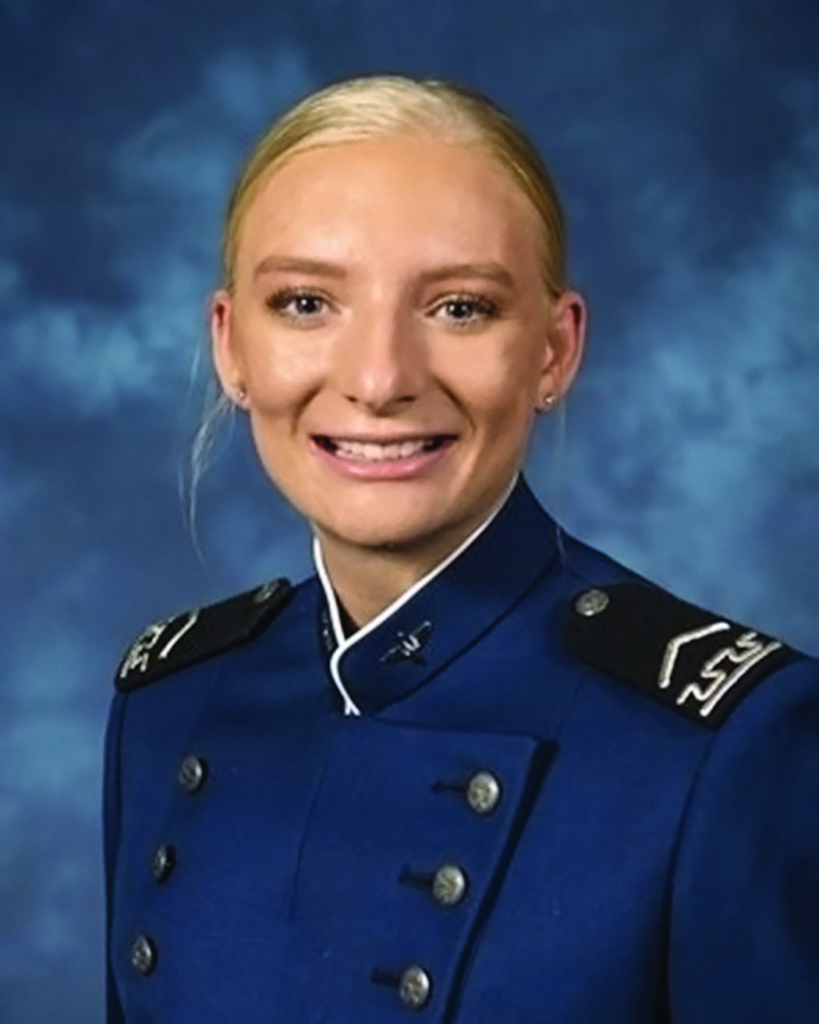
Cadet 2nd Class
Valerie Smith
Pillar 1—Military Training
What aspect of military training have you found to be most interesting?
Going through Basic and EST (expeditionary survival training), I learned the importance of relying on other people and helping other people in any way you can so you can all get through whatever you’re going through together. It was comforting when I found out in Basic that I can struggle with something and it’s fine because somebody’s going to help me out, because I’m going to help them out when they’re struggling also. It’s a give and take.
What characteristic(s) do you feel helped best prepare you for military training at the Academy?
The discipline from doing a sport your whole life and having a coach tell you exactly what to do, and you do it every day. Learning how to be a good follower is really important going into that type of scenario. I was looking for colleges for gymnastics and the Academy sets you up for life. It’s different than looking for other athletic colleges. I looked into it my freshman year, the coach came out my sophomore year, and that’s when I committed. I got a blue chip.
Pillar 2—Academics
What academic strength(s) from high school are helping you in the Academy?
Time management is the biggest thing for me. With [gymnastics] practice for a lot of the day, and everyone has different things going on, but it takes time away from your day. Being able to figure out where you can fit in homework and studying and sleep at night is the biggest thing. A lot of [high school] gymnasts do half-days at school or completely home-school. I never did that, so dealing with full days of school and 20-hour practice weeks is pretty similar.
Have you declared a major? Are there other subjects you’re looking forward to studying?
My major is systems engineering with a focus in human factors. I haven’t taken many courses yet in my major because I’ve been getting through core classes, so I’m interested in getting into the behavioral science side of my major and exploring more about human conditions.
Pillar 3—Athletics
What sport(s) did you play in high school and how did that sport prepare you for Academy training?
Gymnastics helped with the strength side of things, but it does not help with running at all! I leaned on my classmates to help me out there.
What has been your greatest physical challenge?
My greatest athletic challenge is running, especially at altitude.
Is there any difference in what is expected from you as a woman, in terms of physical training?
They know your limitations and they’re not trying to completely break anybody down. They really want to see that everyone is putting in their best and trying their hardest.
Pillar 4—Character Development
In your time as a cadet, what have you learned about yourself, from a character standpoint?
It’s given me more confidence…that if I set my mind on something, I can get through it. There are some weeks where you look ahead and think there’s no way I can get through this. And then you do it. Every time those scenarios come up now, I know how to handle it. I know I can get through it.
Is there a character trait that you hope to develop or refine through your Academy experience?
I haven’t had the opportunity to get a lot of leadership experience. This would be the first year we could work Basic but I’m not working it this year and that’s a huge part of learning leadership. Being a leader is such an important part of our jobs when we graduate.
Future Plans
Intelligence is what I’m thinking now. My aunt is a captain in the Air Force right now, an intelligence officer. She loves it and a lot of my teachers have been intel officers and have planted that seed, so I think it’s something I want to do, but it does change every once in a while. I was med school, but I quickly realized it was not an option for me.
What comes to mind and heart when you think of the Academy’s core values: “Integrity First, Service Before Self, Excellence in All We Do”?
We all have a shared meaning of [the core values], but it’s something that’s ingrained in all of us. We chose this. We chose to accept this and live by this. That’s what gives me a lot of trust in the people around me to have my back when I need it, that I’ll have their back for them, and it does give me a lot of pride knowing that we all live by that.
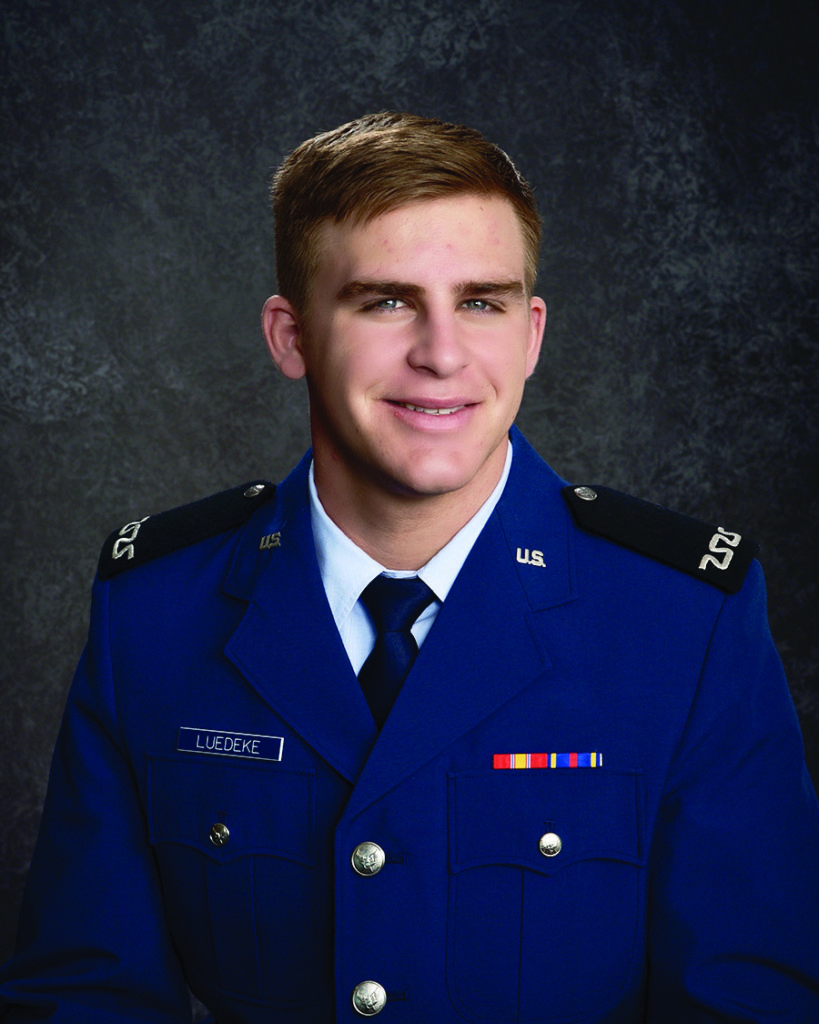
Cadet 2nd Class
Alex Leudeke
Pillar 1—Military Training
What aspect of military training have you found to be most interesting?
Going through Basic, you have a lot of tunnel vision and I wasn’t thinking about how it was going to help me in the future. I was thinking about what I needed to do to get through that moment. I will [lead] a cadre this year for my squadron, so I’ll be working Basic Training.
I had one of the greatest leaders as my cadre [leader]. He was one of the most amazing people I’ve ever met, and I try to model his exact leadership style. I’ve never believed in someone so much. When he talked, you listened. His words were motivating. You could tell how genuine he was, how much he actually meant it. That’s the person I want to be.
The training you receive comes from the peers around you on a day-to-day basis, not so much from the upper levels of leadership. I’m learning from people that I trust and have faith in. It’s a huge thing to get someone to respect you and understand you and actually believe in you, and if you can achieve that, you can get someone to do anything for you which is the whole goal.
What characteristic(s) do you feel helped best prepare you for military training at the Academy?
I take the most pride in my mental fortitude, mental toughness. I was in good physical shape coming in, but what carries me through is being mentally strong. Life at the Academy is 10% physical, but you’re using your head 100%. You have to be mentally strong to get through Basic and your first year so you can move on.
Pillar 2—Academics
What academic strength(s) from high school are helping you in the Academy?
Nothing from high school prepared me for the Academy. [Group laughter] I’ve struggled so much at the Academy; I’ve had to learn everything the hard way. In high school, I would show up and pay attention, take notes, take the test, and I did well. That does not work at the Academy and I wasn’t prepared for that. I’m doing better now, I’m succeeding, but I took punches and had to learn a lot. The biggest thing I’ve learned is how to manage my time. There’s so much going on, especially when you’re an athlete. You’re exhausted after practice, but you have to do your work.
Have you declared a major? Are there other subjects you’re looking forward to studying?
My major is management. I still have more core classes but one I’m looking forward to is aeronautical engineering. You’re in the Air Force—that’s something you need to know about.
Pillar 3—Athletics
What sport(s) did you play in high school and how did that sport prepare you for Academy training?
I played football and lacrosse in high school, but I came [to the Academy] as a football player. I was blue-chipped. There will be nothing you go through [at the Academy] where you’re breezing through. The greatest thing you can do [to prepare] is play a sport. That aspect of learning, in the military and in general, is to become something bigger than yourself, which is what a team is.
What has been your greatest physical challenge?
Recognition. It’s after Basic Training, in the spring of freshman year before moving up. Four days of proving that you should be accepted as an upperclassman in the cadet wing. It is a grueling, awful, painful, terrible experience, but it meant the most to me. Physically, you can’t prepare for anything that’s thrown at you. You think you know…but you’re not ready. It’s how you roll with it. Recognition tests you in every possible way. Mentally, physically, emotionally, everything is tested during that weekend and it was by far the hardest thing I’ve ever had to do.
Pillar 4—Character Development
In your time as a cadet, what have you learned about yourself, from a character standpoint?
Character is subjective and you can interpret it in multiple ways, but the definition I follow is: when you’re stripped down to basically nothing and you can’t put on a façade, you can’t ‘fake it ‘til you make it,’ character is all you have left. Recognition is the closest you can get to that point where you’re so exhausted that all you can rely on is whatever you have inside of you. What I learned about myself is that I’m pretty mentally strong.
Is there a character trait that you hope to develop or refine through your Academy experience?
When I go back to prep for Basic Training, it’ll be my first experience in a real leadership position. I think I’m going to learn a lot about myself and the best way to lead people. The thing to work on is to always know that you never know everything, always be constantly learning from other people. You can learn something from everybody.
Future Plans
I think I want to go into the intelligence career field. I had two teachers who went into that career field and by hearing their stories I think that’s something I really want to do. I think it’s something I might be good at.
What comes to mind and heart when you think of the Academy’s core values: “Integrity First, Service Before Self, Excellence in All We Do”?
That is what the foundation of the Academy is built on, and everything they believe in. Integrity First…integrity is doing the right thing all the time. That’s how you develop a leader of character. Service Before Self…being a part of something bigger than yourself. All five of us chose different paths than most people in life. We could all pay the ultimate sacrifice. That is in our career field, we are in the military, we are in the service of arms. Excellence in All We Do…how do you do that? You can’t, but the ability to strive for that is where you’ll see the best version of yourself and the most improvement. When you try to be excellent in everything, it’s 100% effort all the time in everything and that’s all you can ask of someone.
When you learn about those three values at the Academy, it gives you a lot of pride and that’s something that I’ll hold with me my whole life, how much pride I had that I went to this institution. I learned about these things, I signed up for something bigger than myself, and I strive to be better every day.
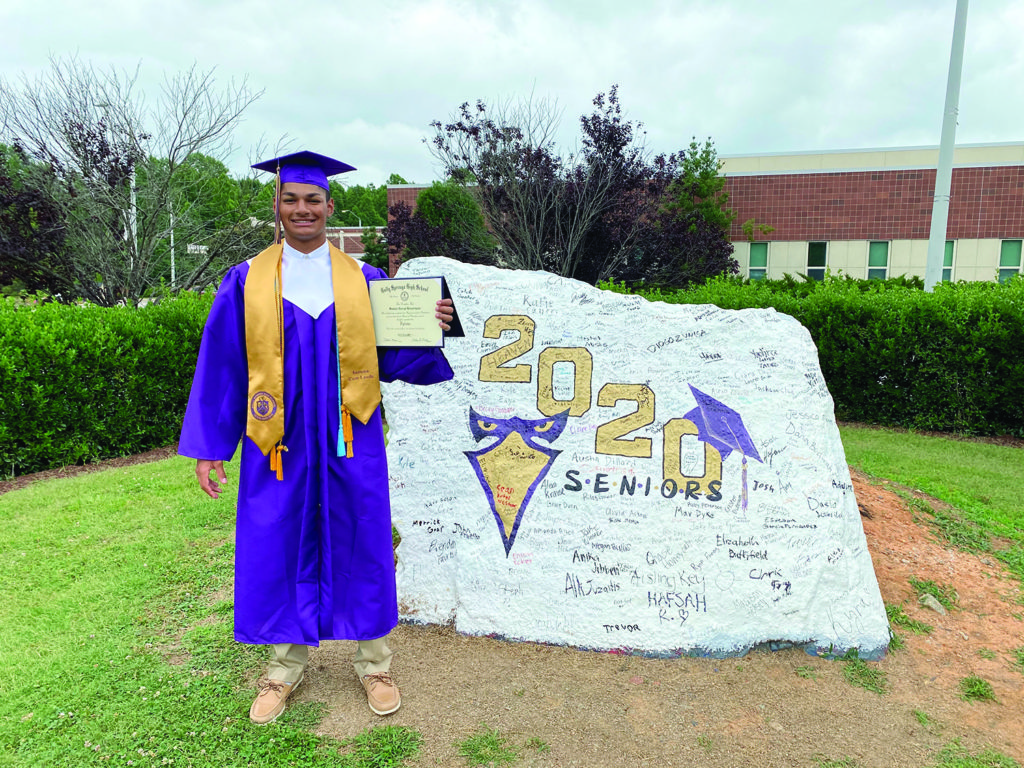
Basic Cadet
Sam Kulasingum
Pillar 1—Military Training
What qualities do you possess that you think will benefit you when it comes to military training?
Not a lot. [Laughter] I’m a good learner and I think that’ll help me. There’s a lot of stuff to remember—basic responses, and you have to address people by their rank and names—and I’ve started trying to learn it, but I’m not even close to memorizing it all. I probably won’t know it all before I get there. I’ll struggle with it like everyone struggles with it, but I feel like I’m a good learner and at some point, I think that’ll help.
Are there any aspects of military training that you are, or are not, looking forward to learning or experiencing?
I’m definitely looking forward to jumping out of planes. One of the things the baseball coach there makes you do is get your wings. He makes all the baseball players jump. I’m looking forward to that. And I feel like if there’s something to be scared of, it should be getting gassed in Basic Training.
Writer’s note: Caleb explained that a long-used exercise during Basic Training involves cadets going into a tear gas chamber in full gear and a gas mask. As the cadets exit, they are instructed to remove their mask and breathe in the gas. The purpose of the exercise is to understand how the protective gear works as well as experience the effects of tear gas on themselves and others.
Pillar 2—Academics
What academic strength(s) from high school do you think will benefit you the most at the Academy?
I’ve heard that everyone struggles academically when you get there. I’ve taken a lot of STEM classes but I’m still going to struggle when I get there. I’ve gotten good grades in high school, but I’ll struggle with computer science and physics and chemistry. I enjoy learning things that interest me. Math, I usually enjoy in some capacity. My favorite subjects in high school were biology and environmental science.
Do you have a major in mind? Are there other subjects you’re looking forward to studying?
I don’t have a major in mind yet. I tell people aeronautical engineering to sound smart, but I don’t really know. I might want to be a pilot…and I’ve looked into materials science a bit, but I’m probably going to go with something in science or math. I hope I can take some environmental science classes, or a biology class. I don’t think I’ll focus my major on that, but it would be something I would enjoy.
Pillar 3—Athletics
What sport(s) did you play in high school and how well do you think that sport has prepared you for Academy training?
In high school, I played baseball and soccer and [the Academy] talked to me about baseball the summer before my junior year. I went on a visit and I talked to Caleb a lot and he told me all about it. That’s what sold me. I don’t think I was blue-chipped, but I verbally committed and signed. I was 20 pounds lighter when I played soccer, but I could run more, and now I’m 20 pounds heavier and can lift more. I’ve been running a lot, but I hate running. I’ve never liked running. In baseball, we do conditioning but it’s not a focus like lifting. I think physically I can do it. It’s a mental battle.
What do you think could be your greatest physical challenge?
Everybody’s going to struggle physically, especially with the altitude, but if there’s one thing I’ll struggle with most, it’s probably the running.
Pillar 4—Character Development
What character trait(s) do you possess that will serve you best as a cadet?
Being competitive and trying to make people around me better. Sports-wise, I’m super competitive. In soccer practice, if you’re not on my team, we’re going at each other. Even though it’s practice, we’re trying to win so we can have bragging rights.
Is there a character trait that you hope to develop or refine through your Academy experience?
I hope I can become a more outgoing leader. I’m a leader but I’m quiet, too quiet, with it. I try to lead by example, but I hope the Academy will help me be more vocal about leadership.
Future Plans
My future plans? I have no idea. I don’t know where I’ll be three months from now. I’ve thought about being a pilot. I have two family members who went to the Academy a while back and I’ve talked to the baseball coach. He flew C-17s. One of the area liaison officers I talked to was also a pilot. I want to fly but I don’t know what I’m going to want to do in four years. I’m just going to try and get through the summer and hopefully figure it out along the way.
What comes to mind and heart when you think of the Academy’s core values: “Integrity First, Service Before Self, Excellence in All We Do”?
It’s the overarching theme of who I’m supposed to be over the next four years and throughout my life. It’s what I should make the foundation of myself on.
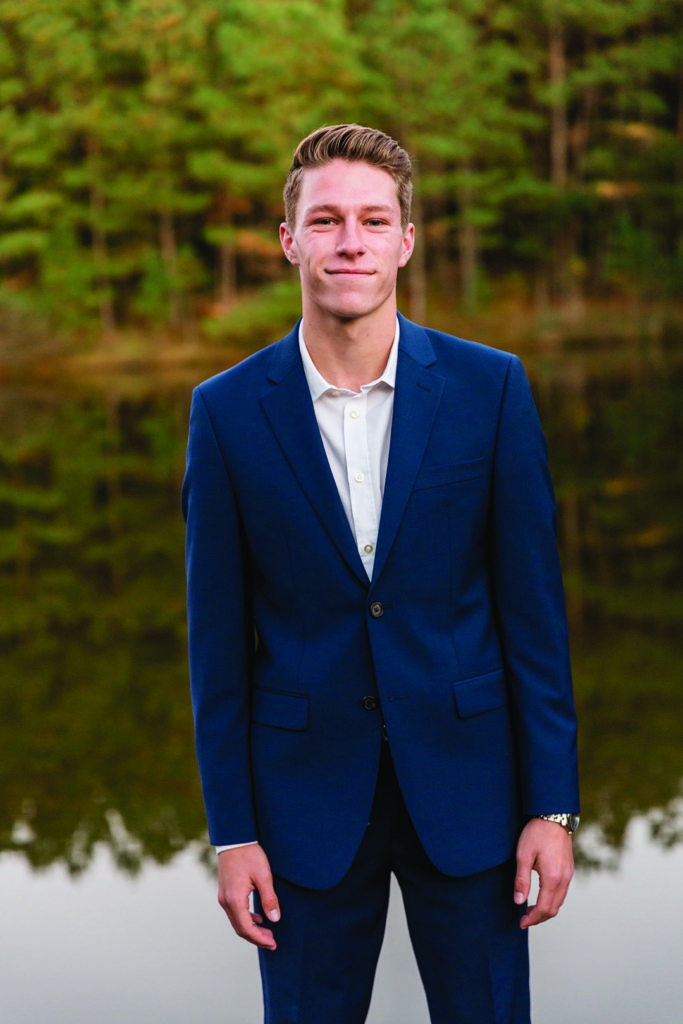
Basic Cadet
Wesley Ferguson
Pillar 1—Military Training
What qualities do you possess that you think will benefit you when it comes to military training?
I would say perseverance. There’s no way you’re going to be prepared going in. Being able to persevere and roll with the punches is the biggest thing, and not just through Basic Training but throughout the whole experience there.
Are there any aspects of military training that you are, or are not, looking forward to learning or experiencing?
The biggest thing I don’t like is just not knowing what to expect [in Basic Training]—other than it’s going to suck. I like looking ahead and being able to prepare and there’s literally nothing you can do.
Pillar 2—Academics
What academic strength(s) from high school do you think will benefit you the most at the Academy?
Time management and good study habits. Being as efficient as possible is a big thing. Getting priorities in line. Something I talked to Caleb about is that he would go bed at 10 or 10:30 every night. And even if there’s schoolwork he still had to do, some nights it just wasn’t worth it. They say [the schedule is] designed [so you] have more stuff in your day than is physically possible to do, so it forces you to prioritize certain things.
Do you have a major in mind? Are there other subjects you’re looking forward to studying?
Not exactly one major or career path in mind yet but flying planes would be fun. That’s what’s great about the Academy—even though I’m not exactly sure what I want to do yet, no matter what you do there you’re going to be a successful person afterwards. It sets you up so well for life.
[In high school,] I was best at STEM subjects, but my favorite subject was history. I’m looking forward to learning more history, especially military history. The conditions around war going back through history has always interested me.
Pillar 3—Athletics
What sport(s) did you play in high school and how well do you think that sport has prepared you for Academy training?
I’ve been playing sports on teams my whole life, and I did soccer and track in high school. [Athletics] is such a big thing at the Academy. Everyone’s going to lean on others at different times and I think team sports prepare you for that. Learning how to be a follower is big.
What do you think could be your greatest physical challenge?
As far as the testing goes, I’d say pull-ups. I’m pretty good at most of the other stuff, and one thing I have going for me is that running is one of my strong suits. I’ve never had a problem with running although the altitude is a big difference. When we visited Caleb, I tried going on runs and it’s completely different. We’ll see how quickly I can adapt to that.
Pillar 4—Character Development
What character trait(s) do you possess that will serve you best as a cadet?
Perseverance will serve me well. Everything there will be a constant challenge but being willing to push through it, knowing that others have gone through it…I can, too. Just having the larger picture in mind. There’s no gain without pain, I guess.
Is there a character trait that you hope to develop or refine through your Academy experience?
Leadership. The military academies produce the finest leaders in the world. I think that’s the most important trait you can have in life, and they’ve been doing it for decades now, so they know what they’re doing. Being able to take that with me into my career, whether I stay in the Air Force or not, will definitely be a good thing.
Future Plans
Every time I think I know what I want to do, someone will tell me about something they’re looking into, or that one of their friends is doing, and I’ll think that sounds really cool and I’ll start considering that. Once I’m there I’ll learn a lot more [and] I’ll figure it out.
What comes to mind and heart when you think of the Academy’s core values: “Integrity First, Service Before Self, Excellence in All We Do”?
I think that statement is the groundwork or structure for what your moral compass is going to be for your entire life, from the second you step foot on campus on I-Day [Inprocessing Day]. It sets the precedent of what to live up to, it’s a standard that everyone who’s ever been a part of it is held to, and it’s the reason why the Academy is such a prestigious institution.